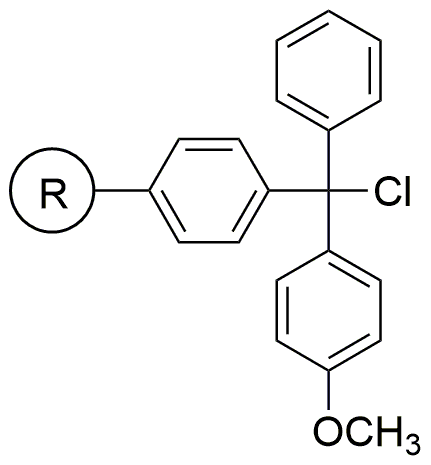4-Methoxytrityl chloride resin is widely utilized in research focused on:
- Nucleic Acid Synthesis: This resin is essential for solid-phase synthesis of oligonucleotides, providing a reliable support for attaching nucleotides, which is crucial in genetic research and therapeutic applications.
- Peptide Synthesis: It serves as a protective group in peptide synthesis, allowing chemists to selectively modify amino acids while preventing unwanted reactions, thus enhancing the purity and yield of the final product.
- Drug Development: In pharmaceutical research, this resin aids in the development of new drugs by facilitating the synthesis of complex molecules, streamlining the process of creating potential therapeutic agents.
- Bioconjugation: The resin is utilized in bioconjugation techniques, helping to attach biomolecules to surfaces or other molecules, which is important in creating targeted drug delivery systems.
- Analytical Chemistry: It is used in the preparation of samples for analytical techniques, improving the efficiency and accuracy of chemical analysis in various research settings.
General Information
Properties
Safety and Regulations
Applications
4-Methoxytrityl chloride resin is widely utilized in research focused on:
- Nucleic Acid Synthesis: This resin is essential for solid-phase synthesis of oligonucleotides, providing a reliable support for attaching nucleotides, which is crucial in genetic research and therapeutic applications.
- Peptide Synthesis: It serves as a protective group in peptide synthesis, allowing chemists to selectively modify amino acids while preventing unwanted reactions, thus enhancing the purity and yield of the final product.
- Drug Development: In pharmaceutical research, this resin aids in the development of new drugs by facilitating the synthesis of complex molecules, streamlining the process of creating potential therapeutic agents.
- Bioconjugation: The resin is utilized in bioconjugation techniques, helping to attach biomolecules to surfaces or other molecules, which is important in creating targeted drug delivery systems.
- Analytical Chemistry: It is used in the preparation of samples for analytical techniques, improving the efficiency and accuracy of chemical analysis in various research settings.
Documents
Safety Data Sheets (SDS)
The SDS provides comprehensive safety information on handling, storage, and disposal of the product.
Product Specification (PS)
The PS provides a comprehensive breakdown of the product’s properties, including chemical composition, physical state, purity, and storage requirements. It also details acceptable quality ranges and the product's intended applications.
Certificates of Analysis (COA)
Search for Certificates of Analysis (COA) by entering the products Lot Number. Lot and Batch Numbers can be found on a product’s label following the words ‘Lot’ or ‘Batch’.
*Catalog Number
*Lot Number
Certificates Of Origin (COO)
This COO confirms the country where the product was manufactured, and also details the materials and components used in it and whether it is derived from natural, synthetic, or other specific sources. This certificate may be required for customs, trade, and regulatory compliance.
*Catalog Number
*Lot Number
Safety Data Sheets (SDS)
The SDS provides comprehensive safety information on handling, storage, and disposal of the product.
DownloadProduct Specification (PS)
The PS provides a comprehensive breakdown of the product’s properties, including chemical composition, physical state, purity, and storage requirements. It also details acceptable quality ranges and the product's intended applications.
DownloadCertificates of Analysis (COA)
Search for Certificates of Analysis (COA) by entering the products Lot Number. Lot and Batch Numbers can be found on a product’s label following the words ‘Lot’ or ‘Batch’.
*Catalog Number
*Lot Number
Certificates Of Origin (COO)
This COO confirms the country where the product was manufactured, and also details the materials and components used in it and whether it is derived from natural, synthetic, or other specific sources. This certificate may be required for customs, trade, and regulatory compliance.


